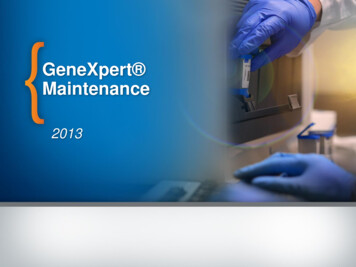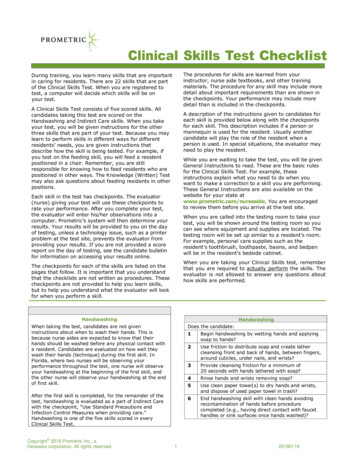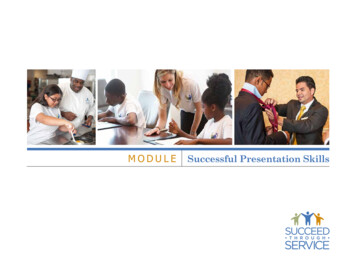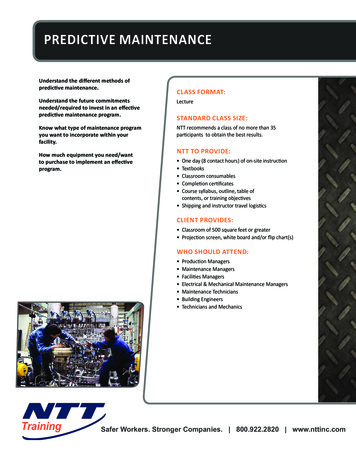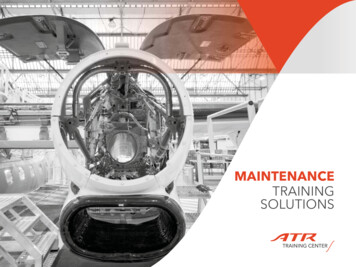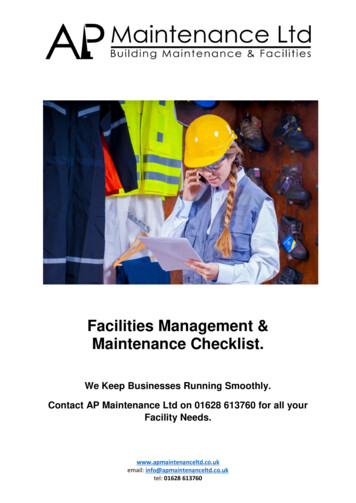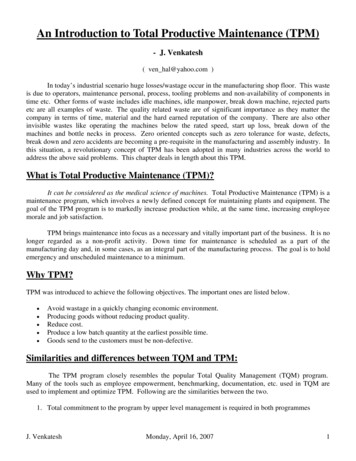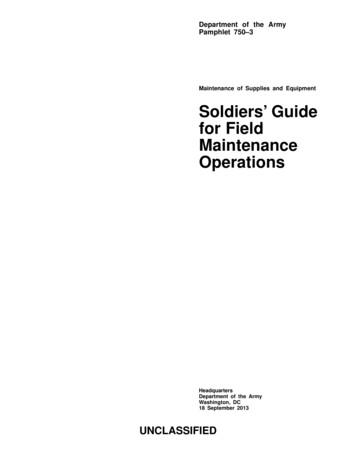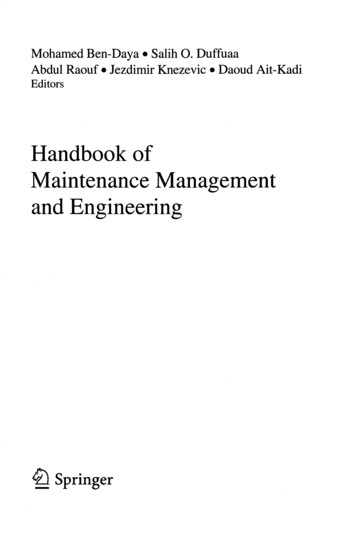
Transcription
Do you fit the bill?8 Skills of SuccessfulMaintenance Managers
Table of Contents!123456782!Title of the book! Leadership Skills Interpersonal Skills Problem Solving Skills Ability to Develop People Time Management Skills Teamwork Skills Adaptability Stress Management
Introduction!As a maintenance and reliability professional, you have technical trainingof some kind, you have a basic knowledge of asset managementprinciples, you have technical knowledge of the equipment you manage,and you have practical experience from years working in the field. Theseare the hard skills needed to perform your job.However, technical education, training, and knowledge will not give youthe skills you need to effectively manage a team of maintenanceprofessionals. In addition to these hard skills, you need a very particularset of soft skills to excel in your role. If mastered, these skills will lead togreater productivity and efficiency across the maintenance team.More importantly, they will lead to less stress, greater job satisfaction,and ongoing career achievement for you. This e-book will cover whatthose important skills are, and how you can master them.3!Do You Fit the Bill: 8 Crucial Skills for Maintenance Managers
!T1. Leadership Skills!“A leader is one who knows the way, goes the way, and shows the way”- John C. Maxwello be a successful maintenance manager, you need to demonstrate leadership ability.You must be self-motivated, organized, trustworthy, empathetic and optimistic. A true leaderhas a clear vision of where they want the maintenance team to go and they set a positive examplethat encourages others to follow. To be a successful leader, your motivation and confidence mustrub off on the team and create a healthy and productive work environmentLeadership is also about getting the job done properly through others. Delegating work tosubordinates is an important function of management otherwise nothing ever gets done. Delegationfrees up precious time so the manager can focus on high-level, high-value activities. Lead Greatleaders get things done by inspiring and empowering others to do great work for them. They fostermotivation by giving subordinates autonomy to do the job, by creating a supportive environment, andby giving recognition when the job is done well. Follow this simple process to ensure the job getsdone correctly:1. Set clear policies and ground rules suchas the level of quality expected.2. Select the best person for the task, notnecessarily the superstar on the team, butthe person with the right skills for the job.3. Agree on what needs to get done andagree on the the timelines4. Provide the resources needed to ensurethey are successful and remove anyroadblocks along the way.5. Follow up at regular intervals to ensurethey are on schedule.6. Recognize them when the work is donewell.4!Do You Fit the Bill: 8 Crucial Skills for Maintenance Managers
2. Interpersonal Skills!“Nothing I say this day will teach me anything.If I’m going to learn, I must do it by listening.”- Larry KingOne of the most important life skills is the ability to communicate clearly and concisely with thosearound you. Having good interpersonal skills means that other people are more likely to see you as calm, yetassertive and employers tend to promote employees with good interpersonal skills, as they can communicateeffectively and maintain good relations with both colleagues and customers. Having excellent interpersonalskills will help you maximize the value of each interaction you have to everyone’s benefit. Maintenancemanagers negotiate daily with subordinates, management, suppliers, contractors, machine operators andproject managers - so effective excellent interpersonal skills are crucial to their day-to-day jobs.One of the best ways to develop your interpersonal skills is to practice active listening. It’s important torealize that listening is not the same as hearing. When we communicate, 45% of the time should be spentactively listening, which means you’re really paying attention to what is being said and not just waiting for yourturn to speak. That way you’re sure to hear other people’s point of view. Good interpersonal skills can be thefoundation on which other life skills are built on, so they must be continually improved and refined.5!Do You Fit the Bill: 8 Crucial Skills for Maintenance Managers
3. Problem Solving Skills!“It is tempting, if the only tool you have is a hammer,to treat everything as if it were a nail.”- Abraham MaslowProblem solving may seem like a straight forward skill tohave, but it’s actually considered to be one of the most complexintellectual abilities. According to a paper by Beyer (1995), criticalthinking means making clear, reasoned judgments. Good criticalthinkers can think clearly and rationally, solve problemssystematically, and make the right decisions quickly.Today’s asset managers need to be both skilled criticalthinkers and problem solvers in order to manage the maintenancebudget, supervise a team of technicians, prioritize work based onneed, manage maintenance metrics and stay on top of the latestProblem Solving Steps:1.2.3.Test out your solution to see if itworked or notthis, the most skilled asset managers will look at all the evidence,interpret the data, evaluate all the alternatives, and consider theirGather the facts and come up with aplan of attacktechnologies. Doing all of these things means processing lots ofinformation quickly, and making quick, effective decisions. To doFigure out what the problem is4.Did it work? Verify or revisit Step 2.top priorities to come up with a solution or suggestion.Problem Solving: The 5 Whys Technique!When you experience a problem, start by asking ‘Why did this happen?” Then repeat the process until a root causebecomes clear. By asking ‘Why?’ repeatedly, you’re filtering out the symptoms and uncovering the problem.For example: Your company missed a big product order when some equipment broke down.1. Why did the equipment fail: It overheated2. Why did it overheat: Cooling fan failed3. Why did the cooling fan fail: Regular service was missed4. Why was service missed: Our paper tracking system was unorganized. It fell through the cracks.5. Why don’t we have an automated preventive maintenance system?: Our maintenance guy isn’t good withcomputersNow you know that just replacing the damaged fan means this problem will probably reoccur. The cooling fan wasn’tthe root of the problem, disorganization was. Now you know that you need a better maintenance managementsystem, like a CMMS, to prevent this from reoccurring.Read more about this here: mple-root-cause-analysis/6!Do You Fit the Bill: 8 Crucial Skills for Maintenance Managers
4. Ability toDevelop People!“The snake which cannot cast its skinhas to die.” - Nietzche!In any business, one of the biggest challenges isfinding, developing and deploying the right talent in order toachieve business goals. A lot of organizations are very goodat hiring and deploying the right people but they forget aboutthe development part.Change is inevitable, so your team needs ongoingtraining and development to learn new skills and take onbigger and more complex challenges. A successfulmaintenance manager works with subordinates to identifytheir areas for improvement and provide them with the training& development they need. Some people may want to furthertheir skills through training and education; others may simplywant more responsibility.Hold regular knowledge transfers so the team canshare information, ideas and experiences. Plan your workorders so experienced team members can mentor the lessexperienced. In addition, if you have well trained, capablepeople you will be able to quickly promote from within whenmore senior positions open up. Identify potential leaders in thegroup and reward them with promotion opportunities whenyou can.Having the ability to develop people is an important skillfor a maintenance manager to master, as it will create aculture of continuous learning and betterment. Make theirlong-term career development one of your top priorities as itleads to a high performing, productive and motivatedmaintenance team.7!Do You Fit the Bill: 8 Crucial Skills for Maintenance Managers
5. Time Management Skills!“You get to decide where your time goes. You can either spend it movingforward, or you can spend it putting out fires. You decide. And if you don’tdecide, others will decide for you.”- Tony MorganTime management is the process of organizing and planning how much of your time you spend oneach activity in order to provide the greatest value for the organization. As maintenance managers,you are constantly interrupted and pulled in different directions by conflicting demands, so it can bedifficult to plan your time. !Don’t run around trying to geteverything done as it comes in!This is inefficient and leads to more stress,missed deadlines, and poor quality ofwork. Don't confuse activity withachievement. Good time managementrequires a shift in thinking from gettingstuff done to achieving results. It’s aboutworking smarter, not harder. Spend 15Genisque modi di beat quam que nullatur anisquos!minutes each morning planning your day,stick to meeting schedules and ensure all!meetings end on time.You can use your CMMS to help plan your day, and your maintenance teams’ day, by prioritizingand scheduling the work. Insist all work requests are submitted through the guest request portalso your phone is not constantly ringing and you can get things done. You can schedule time inyour day to review the work request queue. Reserve the phone for issues that could be critical tothe business. The most effective maintenance managers have excellent time management skillsand get more done in the same time. It’s a valuable skill that can be learned easily and thenhoned over time.8!Do You Fit the Bill: 8 Crucial Skills for Maintenance Managers
6. Teamwork Skills!“The strength of the team is each individual member.The strength of each member is the team.”- Phil JacksonTeamwork is viewed as the most efficientLook for team players who are reliable,way to get things done in any organization. Therespectful, cooperative, flexible, and who showresults achieved by the entire team are greatercommitment to both the team and the task at hand.than the sum of the results achieved by theThose are the people you want to work with.individuals. Why? Well, for one, when individualsAs a successful maintenance manager, youwork together as a team instead of going it alonealso need to recognize the different strengths inthey can bounce ideas off each other and arriveeach individual member of the team and thenat the best solution quicker. Many hands alsocreate teams of people who complement eachmake for light work, so deadlines get met sooner.other and work well together. Putting two type-ATeamwork also often leads to betterpersonalities together is just asking for trouble.decisions, products, or services. All of this meansHaving the ability to get the most out of thethat in your role as a maintenance manager youteam through teamwork and collaboration is aneed to be looking out for and promotingcrucial skill to have and will take you a long way inbehaviors that lead to effective teamwork. !your career.9!Do You Fit the Bill: 8 Crucial Skills for Maintenance Managers
7. Adaptability!“It is not the strongest or most intelligent who will survive,but those who can best manage change.”- Charles DarwinThe world is changing fast. Markets evolve quickly, equipment and systems are getting more complex,health and safety is now the highest priority, Co2 emissions are influencing how we manufacture goodsand we’re using mobile apps for everything. Organizations must be adaptable to maintain a competitiveadvantage. The same is true for individuals. In today’s fast paced environments, you cannot be set inyour ways or you will get left behind. Change is inevitable, so the ability to adapt to change is a crucialskill for maintenance managers to have. In addition, great leaders also have the ability to facilitatechange. The modern maintenance manager must have the ability to adapt quickly in response tochanging circumstances and environments. They must be willing to embrace new ideas, new ways ofworking, and new technologies. The most adaptable individuals thrive on uncertainty and respondpositively when their routine changes.To become more adaptable, you must get out of your comfort zone and push the envelope. You mustcontinually grow, improve and try new things. Learn new skills, adopt new technologies and continuallyreinvent yourself. Challenge the status quo, demonstrate openness to fresh ideas and loose the rigidity.Welcome new ways of doing everyday tasks or ways to make existing work processes more efficient.Being adaptable makes you more approachable and increases your ability to communicate with otherpeople. It also makes you more able to handle change when it happens.10!Do You Fit the Bill: 8 Crucial Skills for Maintenance Managers
8. Stress Management!Stress affects your productivity,quality of work, and overallmental health.!and just getting on with it, managing stressIf stress is allowed to build up over time, itthe controllable you can reduce thecan consume you. As a maintenancechances you’ll suffer from stress.manager, having the ability to handle stresshave the skills mentioned in this book, youmay not be a skill in the strictest sense but itprobably handle very little stress on a day-can mean the difference between successto-day basis. Having the skill to controland failure. Managing stress doesn’t meanstress will keep you in good spirits andtaking a deep breathpositively affect those around you.means controlling the things around youthat can lead to stress. When you controlIf youDid you know Changes in health due to routine, daily stress from the pressures of workcan be hard to notice at first. Over time, this continued strain on yourbody can lead to heart diseases, high blood pressure, diabetes,depression, anxiety and other illnesses.Try to cope by focusing on what you did accomplish, and not the thingsthat didn’t get done. Learn to say no, to avoid becoming overwhelmed,and avoid dwelling on problems.Read more about the effects of stress on your health tress/index.shtml.11!Do You Fit the Bill: 8 Crucial Skills for Maintenance Managers
Conclusion!If your goal is to lead a team of maintenance engineers, thenmaster these skills and you are sure to succeed. If you are alreadyin a position of management, developing and refining these skillswill help you get the most out of your team, help you gain greaterrespect from company executives, and give you moreopportunities for career advancement.Many of these skills intersect so improving one will have a bigimpact on others. Some of these skills will come naturally to youbut they all will require additional effort to perfect. They will helpyou create a healthy work environment where employees lookforward to coming to work and taking on more responsibility andexciting new challenges.“Leaders must be close enough to relate to others,but far enough ahead to motivate them.”- John C. Maxwell
ContactMaintenance Assistant35 Golden AvenueToronto, ON, Canada"P: 1-(855)-884-5619"E: info@maintenanceassistant.comABOUT THE AUTHORJeff O'Brien is a product specialist, CMMS evangelistand industry blogger at Maintenance Assistant Inc.Maintenance Assistant develops and deliversmaintenance software solutions that are used bythousands of asset-intensive businesses around theworld to transform their maintenance operations,eliminate waste and costly downtime, and managerisk. You can contact Jeff via email or LinkedIn.13!Do You Fit the Bill: 8 Crucial Skills for Maintenance ManagersDo You Fit the Bill: 8 Crucial Skills for Maintenance Managers
thinkers and problem solvers in order to manage the maintenance budget, supervise a team of technicians, prioritize work based on need, manage maintenance metrics and stay on top of the latest technologies. Doing all of these things means processing lots of informa

